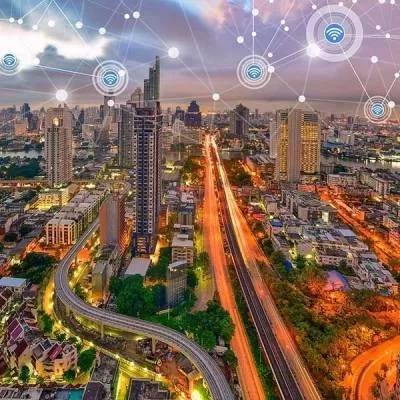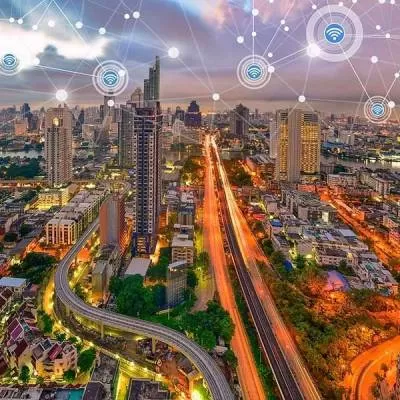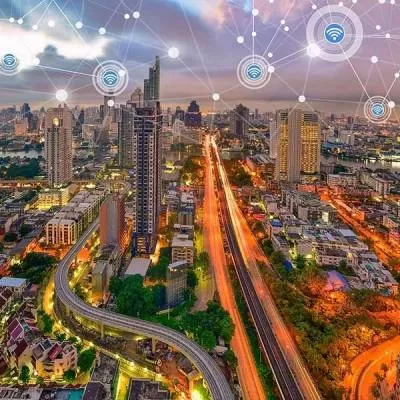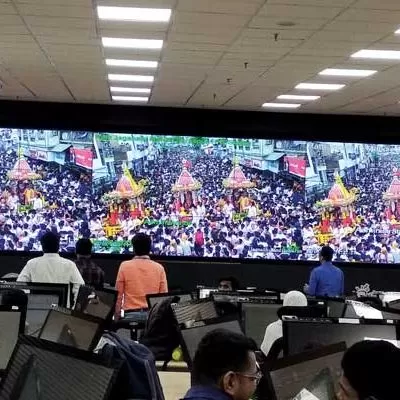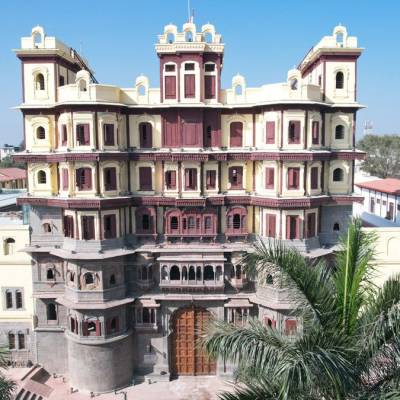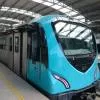- Home
- Infrastructure Urban
- SMART CITIES
- We are deploying projects worth over Rs.10,000 crore in Rajasthan

We are deploying projects worth over Rs.10,000 crore in Rajasthan
Being one of the leading states in implementing schemes backed by the Centre, Rajasthan is always in the forefront, whether it is for energy efficiency or municipal reforms. It now has a target to spend Rs 40,000 crore in the next five years to fill up the gap in urban infrastructure. Dr Manjit Singh, Principal Secretary, Government of Rajasthan, shares more on the government´s future course of actions.
What are the initiatives undertaken by the Rajasthan Government on various fronts for the state´s infrastructure?
The Rajasthan Government has taken initiatives on many fronts such as Swachh Bharat Mission, Smart City Mission, Atal Mission for Rejuvenation and Urban Transportation (AMRUT), GIS-based mapping, Housing for All, HRIDAY, National Urban Livelihood Mission, urban infrastructure, sewerage and water supply, e-governance and energy-efficient street lighting.
To begin with, our Smart Raj Project will improve the delivery of government services to citizens and business. This is a state-wide e-governance project initiated by the present government to cover all urban local bodies (ULBs) and their municipal services. The government has allocated Rs 125 crore to improve service delivery mechanism, transparency in governance and better information management covering all ULBs. We expect this to be completed by March 2018. Under the Smart Raj project, we have included 23 IT modules to take care of all municipal transactions, building permissions and plans, fire safety NOCs, and so on. The Smart Raj project will be integrated on a GIS platform under the GIS-mapping project. We have also deployed a state-level dedicated call centre, which has addressed more than one lakh complaints till March 31, 2016.
Housing is an imperative for the country. How is the state government gearing up for the massive requirement?
I must highlight our initiatives in Housing for All. The objective is to provide housing for all by 2020 in all ULBs of the state through slum rehabilitation, affordable housing in partnership with the private sector and financial subsidy for individual houses constructed. As on date, we have constructed 57,000 houses under RAY, Integrated Housing and Slum Development (IHSDP) and Basic Service to the Urban Poor (BSUP), out of which 40,000 houses have been allotted and possession has been given. The remaining 17,000 is to be allotted within the next three months. For this programme, a timeline has been prepared and issued for construction of about five lakh houses in the next four years. For the current financial year, we have a target to construct 1,000 homes for the economic weaker section.
Meanwhile, under the CM Jan Awas Yojna, the state has issued expression of interests (EOI) for 11 cities, and EOIs for 30 more cities are under process. At present, we have received EOIs for four cities. In addition, EOI has also been received for slum redevelopment on PPP mode.
Now, on to a major issue every municipal corporation in the country is facing û open defecation and solid waste management (SWM). How is the state tackling this menace?
Under the Swachh Bharat Mission, we have constructed 20,776 individual toilets and have the target to complete 4.97 lakh individual toilets by October 2019. In addition, our government has already uploaded applications for 2.60 lakh individual toilets on the website, of which around 1.75 lakh applications have been verified and we have issued sanction notices to 1.28 lakh applications. As far as community toilets are concerned, we have constructed 31,857 so far, and have targeted to build 11,000 more.
For SWM, the government has already started door-to-door collection of waste in 2,010 out of 6,000 wards. Our government has prepared a detailed project report for 117 ULBs, of which we have issued letters of intent for processing plants (RDF or compost) in eight cities till now. We have also invited tenders for mechanisation of transportation and work is under progress. We have finalised tenders for setting up biomedical waste plants in the remaining 15 districts, and have invited tenders for waste-to-energy plants for Jodhpur (400 tpd), Jaipur (600 tpd), and Kota (300 tpd), and are likely to start by June 2018. Tenders for process plant in other cities are in progress. We have already issued a work order for 97 auto-tippers and 1,300 containers.
As far as funding is concerned, the Government of India has allocated Rs 763 crore towards the Swachh Bharat programme, where the state´s share will be Rs 407 core. Till now, the Government of India and the Rajasthan Government have collectively released Rs 187 crore. Interestingly, we issued a notification in July for user charges to be levied for SWM, which will increase the state´s revenue.
How is the Centre´s AMRUT mission shaping up in the state?
Talking about AMRUT, Rajasthan was the first state to get approval under this programme. As of now, we have included 29 cities under AMRUT. The mission components are water supply, sewerage, urban transportation, drainage and green spaces. The total sanctions approved till March 31, 2016, are Rs 1,939 crore. Under this mission, 16 cities will be equipped with sewerage systems, where we will spend Rs 1,300 crore.
For 2016-17, the Centre has allocated Rs 121 crore. As we are planning to provide adequate water supply under this mission, we will spend Rs 540 crore on strengthening the water supply situation in 12 cities. As far as green space is concerned, four cities have been identified so far. We have already issued an LOI for sewerage projects in Bhiwadi, Alwar and Sikar and issued tenders for Jodhpur. Meanwhile, all administrative and financial sanctions are proposed to be issued before October 2016, so enough time is available for implementation. Under AMRUT, all ULBs must mandatorily take up the GIS-based mapping project to enable them in planning, creation, and development of various infrastructure initiatives through a secured and user-friendly Web interface. The cost of the project is Rs 20 crore. It will be in a phased manner, where 29 AMRUT cities will be covered by 2017, followed by all district headquarters and subdivision headquarters. Phase-III will cover the remaining cities.
Please tell us about projects under the Rajasthan Urban Infrastructure Development Project (RUIDP) scheme?
The objective is to provide complete sanitation facilities in urban areas under RUIDP. Under this scheme, we have undertaken 76 sewerage projects in 76 cities covering around 73 per cent of the total urban population. Under this, 11 cities have already been partially benefited with sewerage facilities and are under O&M process. In 25 cities, sewerage works are in process under different schemes to provide partial coverage. To provide safe and clean water supply, water supply projects have been completed in 13 cities under RUIDP-II. Under RUIDP Phase-III and IV, we have received loans from the Asian Development Bank to the tune of $250 million with a project size of $360 million, including the state share of $110 million. Work on six cities under RUIDP has already begun and will be completed in the stipulated timeframe. RUIDP is likely to start from 2017-18 onwards.
How are the ULBs in the state improving revenue sources knowing only a fraction of share comes from property tax?
Now to make all these schemes work and have long-term benefits, it is important that the ULBs become autonomous, generate their share of finances and depend on their own revenues to operate and maintain infrastructure. Apart from this, the accounting of municipalities has to be improved. The objective is to shift from cash-based accounting to an accrual-based accounting system, to update the accounts and get them audited. Hence, to improve the accounting and audit of ULBs, an MoU was signed with Janaagrah.
Major works accomplished after signing the MoU include empanelment of chartered accountants for providing division-wise accounting and audit services and a Municipal Finance Reform Cell (MFRC). This will ensure that all payment is through RTGS, e-tendering exists for every tender and ULBs have financial powers. The MFRC is expected to bring about reforms in the financial management of ULBs by reviewing progress of accounting services and audit of annual accounts.
It will also organise workshops and training sessions for ULB staff and empanelled CAs. MFRC will coordinate, compile and review MIS formats and convene review meetings to take appropriate action with respect to revenue enhancement, funds and budget management. Here, MFRC will have an uphill task for the current financial year as the total grant allotment to ULBs is around Rs 65,000 crore. In the interim, MFRC will also coordinate with the Smart Raj project team to ensure that accounting, budgeting and reporting modules are as per the requirement of ULBs. We have a target to increase revenue from the current 20 per ent to 50 per cent.
- Rahul Kamat
- Dr Manjit Singh
- Government of Rajasthan
- Infrastructure
- Swachh Bharat Mission
- Smart City Mission
- Atal Mission for Rejuvenation and Urban Transportation
- AMRUT
- HRIDAY
- National Urban Livelihood Mission
- Urban Infrastructure
- Smart Raj Project
- GIS
- Integrated Housing and Slum Development
- IHSDP
- Awas Yojna
- Rajasthan Urban Infrastructure Development Project
- RUIDP
- Municipal Finance Reform Cel
- Dr Manjit Singh, Principal Secretary, Government of Rajasthan Being one of the leading states in implementing schemes backed by the Centre, Rajasthan is always in the forefront, whether it is for energy efficiency or municipal reforms. It now has a target to spend Rs 40,000 crore in the next five years to fill up the gap in urban infrastructure. Dr Manjit Singh, Principal Secretary, Government of Rajasthan, shares more on the government´s future course of actions. What are the initiatives undertaken by the Rajasthan Government on various fronts for the state´s infrastructure? The Rajasthan Government has taken initiatives on many fronts such as Swachh Bharat Mission, Smart City Mission, Atal Mission for Rejuvenation and Urban Transportation (AMRUT), GIS-based mapping, Housing for All, HRIDAY, National Urban Livelihood Mission, urban infrastructure, sewerage and water supply, e-governance and energy-efficient street lighting. To begin with, our Smart Raj Project will improve the delivery of government services to citizens and business. This is a state-wide e-governance project initiated by the present government to cover all urban local bodies (ULBs) and their municipal services. The government has allocated Rs 125 crore to improve service delivery mechanism, transparency in governance and better information management covering all ULBs. We expect this to be completed by March 2018. Under the Smart Raj project, we have included 23 IT modules to take care of all municipal transactions, building permissions and plans, fire safety NOCs, and so on. The Smart Raj project will be integrated on a GIS platform under the GIS-mapping project. We have also deployed a state-level dedicated call centre, which has addressed more than one lakh complaints till March 31, 2016. Housing is an imperative for the country. How is the state government gearing up for the massive requirement? I must highlight our initiatives in Housing for All. The objective is to provide housing for all by 2020 in all ULBs of the state through slum rehabilitation, affordable housing in partnership with the private sector and financial subsidy for individual houses constructed. As on date, we have constructed 57,000 houses under RAY, Integrated Housing and Slum Development (IHSDP) and Basic Service to the Urban Poor (BSUP), out of which 40,000 houses have been allotted and possession has been given. The remaining 17,000 is to be allotted within the next three months. For this programme, a timeline has been prepared and issued for construction of about five lakh houses in the next four years. For the current financial year, we have a target to construct 1,000 homes for the economic weaker section. Meanwhile, under the CM Jan Awas Yojna, the state has issued expression of interests (EOI) for 11 cities, and EOIs for 30 more cities are under process. At present, we have received EOIs for four cities. In addition, EOI has also been received for slum redevelopment on PPP mode. Now, on to a major issue every municipal corporation in the country is facing û open defecation and solid waste management (SWM). How is the state tackling this menace? Under the Swachh Bharat Mission, we have constructed 20,776 individual toilets and have the target to complete 4.97 lakh individual toilets by October 2019. In addition, our government has already uploaded applications for 2.60 lakh individual toilets on the website, of which around 1.75 lakh applications have been verified and we have issued sanction notices to 1.28 lakh applications. As far as community toilets are concerned, we have constructed 31,857 so far, and have targeted to build 11,000 more. For SWM, the government has already started door-to-door collection of waste in 2,010 out of 6,000 wards. Our government has prepared a detailed project report for 117 ULBs, of which we have issued letters of intent for processing plants (RDF or compost) in eight cities till now. We have also invited tenders for mechanisation of transportation and work is under progress. We have finalised tenders for setting up biomedical waste plants in the remaining 15 districts, and have invited tenders for waste-to-energy plants for Jodhpur (400 tpd), Jaipur (600 tpd), and Kota (300 tpd), and are likely to start by June 2018. Tenders for process plant in other cities are in progress. We have already issued a work order for 97 auto-tippers and 1,300 containers. As far as funding is concerned, the Government of India has allocated Rs 763 crore towards the Swachh Bharat programme, where the state´s share will be Rs 407 core. Till now, the Government of India and the Rajasthan Government have collectively released Rs 187 crore. Interestingly, we issued a notification in July for user charges to be levied for SWM, which will increase the state´s revenue. How is the Centre´s AMRUT mission shaping up in the state? Talking about AMRUT, Rajasthan was the first state to get approval under this programme. As of now, we have included 29 cities under AMRUT. The mission components are water supply, sewerage, urban transportation, drainage and green spaces. The total sanctions approved till March 31, 2016, are Rs 1,939 crore. Under this mission, 16 cities will be equipped with sewerage systems, where we will spend Rs 1,300 crore. For 2016-17, the Centre has allocated Rs 121 crore. As we are planning to provide adequate water supply under this mission, we will spend Rs 540 crore on strengthening the water supply situation in 12 cities. As far as green space is concerned, four cities have been identified so far. We have already issued an LOI for sewerage projects in Bhiwadi, Alwar and Sikar and issued tenders for Jodhpur. Meanwhile, all administrative and financial sanctions are proposed to be issued before October 2016, so enough time is available for implementation. Under AMRUT, all ULBs must mandatorily take up the GIS-based mapping project to enable them in planning, creation, and development of various infrastructure initiatives through a secured and user-friendly Web interface. The cost of the project is Rs 20 crore. It will be in a phased manner, where 29 AMRUT cities will be covered by 2017, followed by all district headquarters and subdivision headquarters. Phase-III will cover the remaining cities. Please tell us about projects under the Rajasthan Urban Infrastructure Development Project (RUIDP) scheme? The objective is to provide complete sanitation facilities in urban areas under RUIDP. Under this scheme, we have undertaken 76 sewerage projects in 76 cities covering around 73 per cent of the total urban population. Under this, 11 cities have already been partially benefited with sewerage facilities and are under O&M process. In 25 cities, sewerage works are in process under different schemes to provide partial coverage. To provide safe and clean water supply, water supply projects have been completed in 13 cities under RUIDP-II. Under RUIDP Phase-III and IV, we have received loans from the Asian Development Bank to the tune of $250 million with a project size of $360 million, including the state share of $110 million. Work on six cities under RUIDP has already begun and will be completed in the stipulated timeframe. RUIDP is likely to start from 2017-18 onwards. How are the ULBs in the state improving revenue sources knowing only a fraction of share comes from property tax? Now to make all these schemes work and have long-term benefits, it is important that the ULBs become autonomous, generate their share of finances and depend on their own revenues to operate and maintain infrastructure. Apart from this, the accounting of municipalities has to be improved. The objective is to shift from cash-based accounting to an accrual-based accounting system, to update the accounts and get them audited. Hence, to improve the accounting and audit of ULBs, an MoU was signed with Janaagrah. Major works accomplished after signing the MoU include empanelment of chartered accountants for providing division-wise accounting and audit services and a Municipal Finance Reform Cell (MFRC). This will ensure that all payment is through RTGS, e-tendering exists for every tender and ULBs have financial powers. The MFRC is expected to bring about reforms in the financial management of ULBs by reviewing progress of accounting services and audit of annual accounts. It will also organise workshops and training sessions for ULB staff and empanelled CAs. MFRC will coordinate, compile and review MIS formats and convene review meetings to take appropriate action with respect to revenue enhancement, funds and budget management. Here, MFRC will have an uphill task for the current financial year as the total grant allotment to ULBs is around Rs 65,000 crore. In the interim, MFRC will also coordinate with the Smart Raj project team to ensure that accounting, budgeting and reporting modules are as per the requirement of ULBs. We have a target to increase revenue from the current 20 per ent to 50 per cent. - Rahul Kamat


